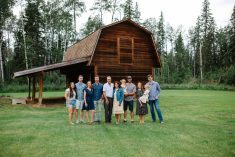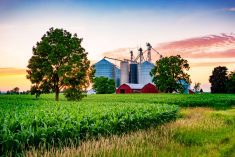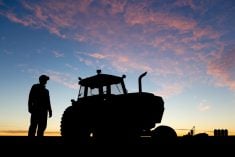The dad-daughter relationship is emerging as one of agriculture’s greatest strengths. Country Guide spoke with two young Manitoban women about how they’re harnessing the power of this dynamic to grow their farms.
– April Stewart, CG Associate Editor
Maybe it used to be a struggle for Dad to stop being Dad and become a business partner. especially if it’s his “little girl” that’s stepping up to take over the farm. Sometimes it still is, but on a growing number of farms, dads and daughters are not only getting the job done, they can also teach some lessons in best practices to dads and sons.
Read Also

Sibling squeeze part 6: The emotional stakes of a family legacy
The final instalment in a six-part series exploring the challenges of sibling conflict and the effect it can have on…
So how are daughters and dads harnessing this dynamic, zooming past the occasional eye rolls they still get to some well-deserved pats on the back? Country Guide put some probing questions to two young women near Dauphin, northwest of Winnipeg. Their responses are below, lightly edited for flow and length.
Gracey Gulak, Manitoba
At 22, Gracey Gulak is a fifth-generation grain and cattle farmer on the 1,500-acre family farm pioneered by her great-great-grandfather at Gilbert Plains. She is also a diploma ag graduate, working off-farm in agronomy for 360 Ag Consulting.
Over the last two years, though, Gracey has announced to her father, Peter, that she wants to farm. More than that, at the end of the day, she wants to have his job, becoming the decision maker for their family farm.
What is your transition plan?
We don’t have a concrete plan, nothing that is set in stone although we do try to give ourselves deadlines and keep each other accountable for certain aspects on the farm. But our plans are always changing, just like the ag industry is always changing.
I am not in a rush… I just want to do it slowly and where we are both comfortable with the situation, because I’m still working full-time. This is what’s working for us. We want to transition slowly and it never means pushing my dad out of the picture. I would like to farm with him as long as I possibly can.
Where are you at in that transition?
What we have done in the past few years is draw up some legal documents to help keep each other accountable, things like rental contracts for the land rent. I currently rent 110 acres and I hope to increase that number this coming spring. In my first crop year, I purchased grain bins for my own grain storage.
We also have put some equipment rental agreements in place where I will pay for the use of the equipment (that is still owned by my dad), as well as the fuel and any parts that are needed. I have set up my own accounts at the ag retailers, so all our inputs like seed, fertilizer and chemicals are separate. I find it easier to keep track of things that way. And I purchased some bred cows to start building my own herd.
How do you succeed at working together as business partners?
Keeping each other accountable is very important because sometimes it’s easy to let things get put on the back burner when you’re dealing with a relative. My dad is someone I see all the time. But a farm operation is a business, and this is my business partner that I’m working with so I want to treat that relationship in a professional manner.
In the big picture, we have similar goals in relation to doing a good job of our management and wanting to improve the soil health. But I do recognize that he is sometimes stuck in his ways and I feel sometimes I am more adaptable to change than he might be. So, we talk about that often.

How have you got your dad onboard with the changes you have made or want to make? How do you handle disagreements?
Whenever I’m trying to bring up a new idea, such as upgrading equipment, I present him with lots of information. I write it out to present to him and show him the benefits or the advantages to trying something new. I present him with lots of options because it doesn’t have to be my way, we can find a way to compromise and what works best for us because every farm is different.
I’m not expecting him to do everything I say because he is still the main manager but I’m just slowly getting more input on the decision-making processes.
My goal is to not pick up more acres, but to be managing what we have the best I can and maximize potential in a sustainable manner.
What do you do to inspire your dad’s trust and confidence?
I need to build trust with my dad to show him I am committed, involved and capable of potentially managing in the future… he has to be sure the farm is going into good hands.
Through the work I do off-farm, where I am exposed to many different environmental and soil conditions, and different seed and chemical treatments and practises, I have been able to demonstrate that I can make educated decisions about our farm input purchases.
My dad trusts me to make spraying decisions because I scout all the fields on the farm throughout growing season. Having eyes on them all season long helps identify optimal spray times so we can get the best results and cost efficiency from the products we use.
Dad also allows me to take the lead or consults with me when we are looking to implement any new technology on the farm. The technology aspect comes slightly easier to me, but I do have to remember to put myself in his shoes and recognize all the changes he has encountered throughout his farming career.
Are you treated differently than if you were a son taking over the farm?
My dad has four daughters, so he treats us all the only way he knows. Any of us could be future successors. I feel that I did grow up in a constructive, hard-working environment just like any other farm kid, whether girls or boys. I do think I had less experience with equipment maintenance which is definitely a weakness of mine that I am challenging myself to learn now. If I’d had that foresight, I may have already had some years of experience under my belt. In all other aspects I feel that I am treated no differently than if I was a son taking over.
How is your Dad preparing you for a management and decision-making role on the farm?
He has helped me a lot on the financial end of the business and encourages me to do a yearly net worth statement. This allows me to assess what I have done throughout the year, compare my finances from year to year and make improvements in the future. He has also helped me to run the numbers before making a purchase. This should be common sense, but it is easy to make impulse decisions.
I also understand that time management is important and there are priorities that need attention with both the grain and cattle sides of the farm. We both share a holistic view of management and that’s always in the back of our minds when thinking about the long term.
What are some changes you want to make?
Something we are discussing in the near future is to purchase a new seeding implement. My goal is to upgrade so we have the ability to do variable rate (VR) and to provide better efficiency on the farm. With my job, I promote and see the benefits of zone sampling and applying fertilizer and seed by VR.
What more do you need to learn?
Dad encourages my learning by pushing me to find ways to stay educated. That includes reading articles, asking me questions, continuous research to find better ways to improve sustainability on the farm in the short and long term. There’s always something new, for example, new products, chemical resistance issues or new diseases or bugs. I want to stay on top of those things….
I am also interested in taking some business courses to get a better handle on finances. This is all new for me and the best way to understand it is to be actively involved. I want to develop better knowledge in this sector. Being willing to learn and adapt is something that’s never going to stop, no matter how old you are.
McKinna Klassen, Manitoba

McKinna Klassen farms with her dad, Keith Kotyk, uncle, Ken, and younger brother, Colton, about 30 minutes west of Dauphin, where she is taking over the 3,000-acre grain side of the operation with the help of her brother, who is also taking on the 300-head cow herd.
McKinna is 26 and studied agribusiness and worked as an agronomist after high school. Then, after a short stint in banking, she ended up in her current off-farm career as a grower support representative for Cargill.
Klassen recently married Michael, who has his own family farm. Although they may help each other out from time to time, though, the two operations are totally separate from each other.
What is your transition plan?
My dad and uncle have seen me helping out on the farm over the years and were 100 per cent convinced that I was capable of taking over the farm. We are looking to continue to slowly expand the grain farm and my brother has been expanding the cattle side of the business quite quickly. He knew that was something he had to do if he wanted to farm full-time.
At some point, when we have expanded the grain side of the farm to a point where I feel comfortable, and my dad and uncle look to fully retire, I will quit my off-farm job to farm full-time.
Where are you at in your farm transition?
In the early spring of 2019, my grandfather decided he no longer wanted to be part of or live on the farm. We worked through a transition plan with him and he decided to transition his farmland to me and my brother. He skipped a generation in the transition.
In 2019, my brother and I also purchased our own first farmland together and purchased more in 2022 with the help of our dad and uncle.
Today, I make the majority of the crop input and grain marketing decisions on the farm. My brother handles all of the cattle decisions and a majority of the cattle work. He also does most of the equipment maintenance and purchasing decisions — he decides what model, year, condition we should purchase — and I make the financial decisions about whether we can afford to upgrade something. I do the books and financials, and the actual farm work we do together alongside our dad and uncle.
We still have our dad and uncle’s farmland to transition from them to us. We have discussed this with our dad and uncle and are making the steps to transition the land over time when they are ready.
How have you got your dad onboard with the changes you have made or want to make?
We have open conversations, and I think sharing my knowledge and ideas has helped us to make changes.
Purchasing more farmland was an idea that took some convincing for my dad and uncle, because we hadn’t purchased any new land or rented any in 20-plus years. But as my brother and I proved that we wanted to farm, they began to realize that we needed to expand to do that and keep us around.
What do you do to inspire your dad and uncle’s confidence?
My brother and I found farmland to purchase, made the offer to purchase and made moves to secure the financing on our own (although we needed our dad and uncle to help us make the purchase). I think they were proud of the steps we made on our own and at a young age —
I was 21 and Colton was 19 — as well as us making a financial commitment to help it expand and be successful.
At 25, I rented my first quarter of land. Again, I found the land and made the deal with the landowner myself without the help of my dad and uncle, and this was the first grain farmland we have rented in many years. That did take a bit of convincing!

Are you treated differently than if you were a son taking over the farm?
Definitely by my grandfather, but not by my dad and uncle.
My grandfather had a very traditional attitude. I found it difficult to prove to him that I could farm. I had to prove to him that I was 100 per cent invested in the farm, from taking my agribusiness diploma, getting my Class 1A licence, purchasing farmland, working at an ag retail to providing advice and making the main input and grain marketing decisions on the farm. These were things I had to do to earn his trust and respect that my brother did not have to.
My dad and uncle were always very supportive of me helping out on the farm. They gave me the same opportunities they gave my brother. They were just happy to have the help. They taught me to drive equipment and how to check fields and cattle at the same young age.
I was once scared to learn how to run a different piece of equipment on the farm and kept avoiding learning how, until one day my uncle said, “This is a family farm. Everyone has to know how to run every piece of equipment.”
That was when it hit home to me that he was 100 per cent invested in helping me farm and my gender didn’t matter.
How have your dad and uncle prepared you for a management role?
My dad and uncle prepared and taught me management and decision-making by including me in the decision-making process long before I started making decisions. They would have the decision-making and tough conversations in front of me and my brother. They were very open in making us aware of where the farm was at in terms of work that needed to be done and financial conversations. I think including me in the struggles they were facing and listening to them work through them helped. As well, they never sugar-coated any of the challenges they’ve faced in their time farming.
What are some changes you want to make to the operation?
I would like to finish the transition planning with my dad and uncle when they are ready, as well as work on making the cattle and grain farm one farm rather than it being separate. They can help offset each other when one or the other has a tough year.
What more do you feel you need to learn?
Currently, I love having an off-farm job in a related field to help me expand my knowledge and bring innovation to the farm. I feel I’m never done learning!
Do you have advice for other young women looking to farm?
A lot of farmers assume the farm is over after them if they don’t have sons. I still see a lot of young girls that grow up on the farm but aren’t encouraged to farm… As a girl, I was sometimes intimidated about wanting to farm, whether from teachers, adults or other kids (boys) my age that grew up on a farm. You have to ignore the comments you sometimes get.
I grew up with a mom who worked full-time off the farm and still found time to help run equipment and check cattle, so I had a great example at a young age that females can have a huge role in the family farm.
My biggest advice is to just go for it, get involved as soon as you can. The transition plan can still include you, even if you have a brother. You might need to work a little harder to prove yourself, but it will help you in the long run.
– This article was originally published in the February 2024 issue of Country Guide.
















